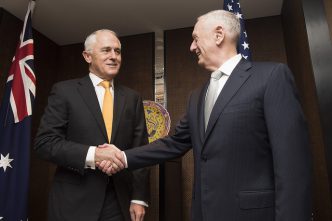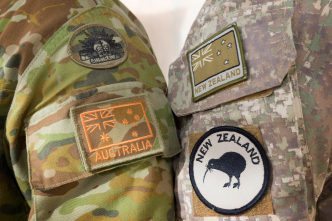The sudden schism between Qatar and a Saudi Arabian-led coalition has already produced wide-ranging consequences. While Qatar continues to deny charges of supporting Islamist extremism, Turkey and Iran have intervened to ease the country’s isolation. …
North Korea’s quest for nuclear weapons is often depicted as a ‘rational’ response to its strategic imperatives of national security and regime survival. After all, the country is surrounded by larger, supposedly hostile states, and …
The encryption debate has continued to dominate cyber security news this week. German ministers discussed measures to monitor encrypted messaging by forcing ‘source telecoms’ to install monitoring software. Conversely, the European Parliament is currently considering …
Prime Minister Turnbull’s keynote address to the recent Shangri-La Dialogue turned upon one critical question: what kind of peace does Australia hope to see in the 21st century Indo-Pacific? That’s not a small question. Turnbull’s …
The blood stains on the classroom walls couldn’t be washed away following the Taliban attack on the middle school in Postak Bazaar village in Afghanistan. ‘We had to chip it away from the wall with …
Sea State An Iranian ship came within 730m of three US Navy vessels (an amphibious assault ship, a guided-missile destroyer and a dry cargo ship) in the Strait of Hormuz last week. The Iranian vessel …
David Gardner’s recent Strategist post Israel, the Six-Day War and the end of the two-state solution is what you’d expect from a journalist reporting from Lebanon, a country still officially at war with Israel, and …
The Australian Defence organisation has an undeserved reputation for supposedly ‘devouring’ its ministers. The generally high throughput has instead had far more to do with the portfolio being frequently allocated to those already in the …
The debate about law enforcement access to encrypted communications has flared up again recently. It seems that everyone has a view on the subject, including a string of American visitors to our shores: US Senator …
Australia’s decision to spend $50 billion on 12 French diesel-electric Shortfin Barracuda submarines reflects a long-established government preference for non-nuclear submarine forces. But will this preference remain strategically credible in future years if our strategic …
Last month, Chinese President Xi Jinping presided over a heavily orchestrated ‘Belt and Road’ forum in Beijing. The two-day event attracted 29 heads of state, including Russia’s Vladimir Putin, and 1,200 delegates from over 100 …
The technical bastardry of the Australian Broadcasting Corporation in degrading its shortwave broadcasts to the South Pacific has been starkly revealed. The bloody-mindedness helps explain the dumb decision to turn off Australia’s shortwave service that …
G’day, loyal readers; welcome back. First up in our list of recommendations this week is a handful of pieces around the 50th anniversary of the Six-Day War. We’d be remiss if we didn’t start with …
10 years ago, al-Qaeda (AQ) was in shambles. Thanks to American and Pakistani-led operations, they had no training camps, limited money and few adherents. They also faced increasing challenges to their position as the inspirational …
Even after weeks of waiting, the Trump administration has yet to reveal its decision on what it will be doing in Afghanistan. This delay isn’t surprising, given the many other troublesome domestic issues competing …
The appalling carnage in the Middle East and Afghanistan hasn’t dampened the appetite for war. It would be absurd to lay the total blame on the US and its allies for those calamities. They faced …
America’s strategic deficit in the Asia–Pacific region was in plain sight during the recent Shangri-La Dialogue in Singapore. Although North Korea was a key concern for all participants, many—especially those from Southeast Asia and Australia—found …
The Beat When gun research is silenced Gun science silence is a tongue-twister, but that’s no reason to keep quiet about it, Harvard Professor David Hemenway argues in Nature. While Research on gun-related violence can …
Southeast Asia accounts for sizeable chunks of global investment and manufacturing capacity; it straddles vital lines of trade and communication. Whether it is mobile phone parts or clothing and accessories, Southeast Asia is a vital …
The fact that New Zealand is planning to replace its 13 largest military aircraft between 2020 and 2025 is a big deal. One project team is studying the future capabilities required to replace two Boeing 757 …





















